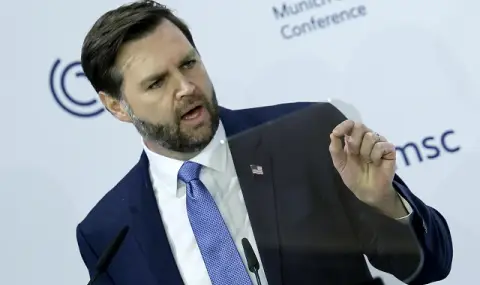US Vice President J.D. Vance today called on Europe to strengthen its defense capacity so that Washington can focus on threats in other regions of the world, reported Agence France-Presse, quoted by BTA.
"We believe it is important, as part of a common alliance, that Europeans strengthen their defenses while America focuses on the regions of the world that are in great danger“, Vance said at the Munich Security Conference.
During his speech to delegates at the forum, J.D. Vance called on European representatives to stop illegal migration to the continent, reported the Associated Press.
Vance said that European voters did not vote to open the "gateways for millions of unverified immigrants".
Earlier in his comments on Friday, the US vice president mocked Europe for suppressing free speech, saying that freedom was in danger.
He also emphasized the US demand that NATO increase its defense spending, speaking at a time of great concern and uncertainty about the Trump administration's foreign policy.
The future of Ukraine is a major item on the agenda of the Munich meeting after a phone call between US President Donald Trump and Russian leader Vladimir Putin this week, in which they pledged to work together to end the three-year Russia-Ukraine conflict.
Vance is expected to meet with Ukrainian President Volodymyr Zelensky later today for talks that many observers, especially in Europe, hope will shed at least some light on Trump's ideas for settling the war through negotiations.
Vance began his day in Munich with separate meetings with German President Frank-Walter Steinmeier, NATO Secretary-General Mark Rutte and British Foreign Secretary David Lamy. He used the engagements to reiterate the Trump administration's call for NATO members to spend more on defense. Currently, 23 of NATO's 32 member states meet the goal of spending 2 percent of their GDP on defense, the AP reported.
"NATO is a very important military alliance, of course, of which we are the most significant part," Vance told Rutte. "But we want to make sure that NATO is truly built for the future, and we think a big part of that is making sure that the burden in NATO is shared a little bit more by Europe, so that the United States can focus on some of our challenges in East Asia."
Rutte said he agreed that Europe needs to step up. "We need to grow up in that sense and spend a lot more," he said.
US Vice President J.D. Vance accused his European allies on Monday of trampling on free speech and undermining democratic values, the DPA reported.
"I fear that in Britain and across Europe, free speech is in retreat," he said, after recounting a series of anecdotes - from Germany to Sweden to Britain - that he said showed how "fundamental freedoms" were being undermined.
During his speech at the Munich Security Conference, J.D. Vance lectured European officials on free speech and illegal migration on the continent, warning elected officials that they risk losing public support if they don't change course quickly, the Associated Press reported.
In his speech at the Munich Security Conference security conference, Vance mentioned the attack in the city the day before, carried out by a 24-year-old Afghan who deliberately drove his car into a crowd and injured 36 people.
He called it a "horrific story" that we have heard "too many times in Europe and, unfortunately, too many times in the United States."
"How many times do we have to suffer these horrific failures before we change course and take our common civilization in a new direction? Not a single voter on this continent has gone to the polls to open the gates to millions of unvetted immigrants."
"In Washington, there is a new sheriff in town. "And under Donald Trump, we may not agree with your views, but we will fight to protect your right to put them forward for public debate," Vance said to timid applause.
Vance was speaking at the Munich Security Conference, a high-level meeting of political leaders and defense experts that focuses on geopolitical threats.
The US vice president, however, seemed to suggest that the dangers to Europe come from within.
"The threat I worry about most in Europe is the threat from within - Europe's retreat from some of its most fundamental values that it shares with the United States of America," Vance said.
